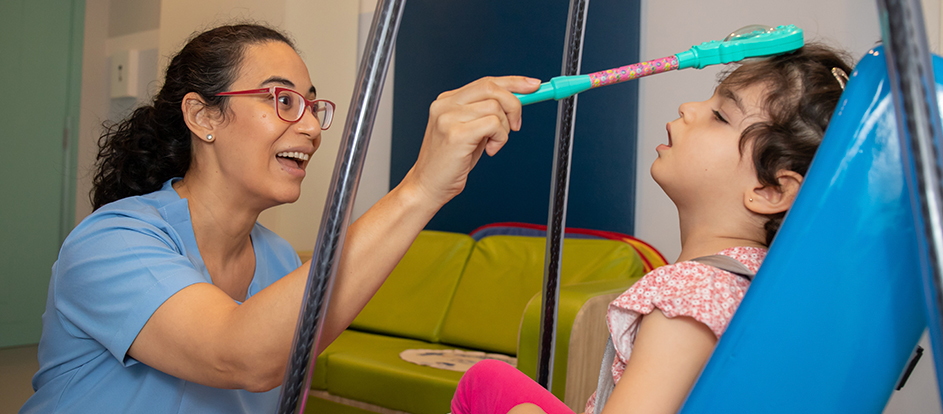
March 2023 marked three years since COVID-19 was declared as a pandemic by the World Health Organization. Life in the UAE is back to normal, as the COVID-19 cases have reduced allowing us to return to our old lifestyle: socializing, traveling, attending cultural events and concerts, especially that wearing masks is no longer mandatory.
In the Communication Science field, a significant number of health agencies have reported a surge in the demand of Speech and Language Therapy with many families struggling to access intervention services. In November 2022, a BBC report showed that in the United Kingdom, the number of children needing Speech and Language Therapy has increased following the lockdowns. The BBC analysis shows that the number of five and six years old needing intervention has increased by 10% in England. This is an age group that had recently joined academic life and experienced significant disruption with the lockdowns.
More children need speech and language support
Total Year 1 pupils needing support in English primary schools, by end of academic year.

BBC reports a similar situation in Scotland, revealing the existence of a significant backlog where children have been waiting to access Speech and Language Therapy for over a year.
In the UAE, we also observed a surge in the demand for Speech and Language Therapy as many colleagues and clinics report an increase in numbers of children needing this therapy service.
Here, we will review relevant research and data regarding the impacts of the pandemic on children’s development. The COVID-19 pandemic has hit us recently but is it already possible to determine if it has caused an impact on children’s development? During the pandemic, children experienced reduced social contact, lack of exposure to a variety of environments, masking, stressful households, etc. Did any of these factors contribute to a surge in language delay? We already have recent research about COVID-19’s impact on infant development. The number of studies is not vast although it shows interesting results and possible answers to our question.
Research conducted in a hospital in New York City by Shuffrey et al (2022) compared children born during the pandemic with those born before. The authors administered the Age & Stages Questionnaire – 3rd edition (ASQ-3) in the group of 289 children. The children born during the pandemic had lower scores on the ASQ-3 in the areas of gross motor, fine motor, and personal-social domains at 6 months of age.
Another research by Huang et al (2022) that took place in China with a much higher number of participants revealed that while there were no differences on development when the children completed 6 months, later when the children completed their first birthday, they were more likely to present delays in their fine motor and communication skills when compared to children born before the pandemic.
Imboden et al conducted an experiment in two pediatric practices where they reviewed charts of 1024 patients and found no significant differences in ASQ-3 scores pre-pandemic to post-pandemic for their overall sample of infants and toddlers. However, when they looked at the 6-months old group, they found that the ones born during the pandemic had lower problem-solving scores than those born pre-pandemic. The opposite was true for the two-year olds in the study.
The studies agree that the pandemic has the potential to affect childhood development. However, the results display a slight change in differences in developmental scores pre-pandemic versus post-pandemic. More studies are needed to establish the real impact of COVID-19 on children’s development.
Researchers agree that are probably many contributing factors for why we are seeing delays. One of the most likely factors is the COVID-19 related stress. Pre-pandemic research has shown that stress can impact caregiver-child interactions and thus development. People experienced a variety of stressors during the pandemic related to housing and food insecurity, job loss, changes in mental health, and inconsistent childcare. Furthermore, there is no strong scientific evidence showing that masking might have an impact on development. Morag et al (2022) conducted a study with 50 parents who had to complete a questionnaire. They found that children who spent more time with masked adults had a smaller expressive vocabulary, but no differences were found on their receptive vocabulary. Here, it is noteworthy to mention that masking is a very effective way and scientifically proven mean to limit the spread of COVID-19, so we should continue using it when needed with the purpose of protecting ourselves and others.
Researchers highlighted that health agencies should increase their focus and develop policies to increase communication screening and promotion of language development and communication skills in young children post-pandemic. Other measures to be taken include parental support and education about the importance of caregiver-child engagement, free-play and exploration. Also, reduction of stress and providing support to parents is recommended.
Another key point is to read carefully what is being shared in the news. All studies have strengths, weaknesses, and limitations. There are always more aspects than can be discussed in a news article. It is also very difficult to determine and prove what causes what. The COVID-19 pandemic had an immense impact on our public and private lives, so any claim that x caused y is an oversimplification of very complex relationships. Finally, population level findings have limited implications for individual children, these types of information display trends, and we must take in consideration that each child and family experiences are unique.
Finally, be mindful of the excessive focus on milestones. The idea of helping kids catch up is a very tricky one as this might reinforce the idea that there are specific benchmarks that children need to achieve with the aim of ‘being alright’. Keep in mind that milestones are only one part of the big picture and tell us only a part of your child’s development. It is better to focus on what we know has a positive impact on our children that is a nurturing healthy environment with rich relationships rather than checking off lists. As always if you have any other questions or concerns about this topic, please feel free to contact our Speech and Language Therapy team at High Hopes Pediatric Therapy Center.
Sources:
- https://www.bbc.com/news/education-63373804 IN: Child speech delays increase following lockdowns.
- Huang, P. et, F., Guo, Y., Yuan, S., Lin, S., Lu, J., Tu, S., Lu, M., Shen, S., Guedeney, A., Xia, H., & Qiu, X. (2021) Association between the COVID-19 pandemic and infant neurodevelopment: A comparison before and during COVID-19. Frontiers in Pediatrics.
- Imboden, A., Sobczak, B., & Griffin, V. (2021). The impact of COVID-19 pandemic on infant and toddler development. Journal of the American Association of Nurse Practioners.
- Morag, I., Berezin, A., Zivan, M., & Horovitz-Kraus, T. (2022). Children exposed to masked adults in the first year of life demonstrated lower expressive vocabulary. Acta Paediatrica.
- Shuffrey, L. C., Firestein M.R , Kyle M.H. et al (2022). Association of birth during the COVID-19 pandemic with neurodevelopmental status at 6 months in infants with and without in utero exposure to maternal SARS-CoV-2 infection. Jama Pediatrics.





